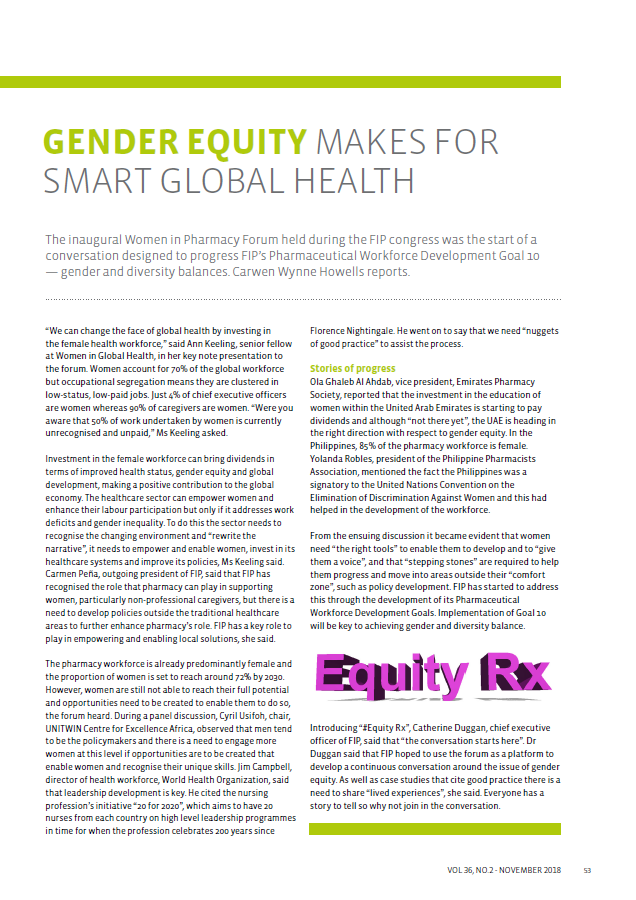The inaugural Women in Pharmacy Forum held during the FIP congress was the start of a conversation designed to progress FIP’s Pharmaceutical Workforce Development Goal 10 — gender and diversity balances. Carwen Wynne Howells reports.
“We can change the face of global health by investing in the female health workforce,” said Ann Keeling, senior fellow at Women in Global Health, in her key note presentation to the forum. Women account for 70% of the global workforce but occupational segregation means they are clustered in low-status, low-paid jobs. Just 4% of chief executive officers are women whereas 90% of caregivers are women. “Were you aware that 50% of work undertaken by women is currently unrecognised and unpaid,” Ms Keeling asked.
 Investment in the female workforce can bring dividends in terms of improved health status, gender equity and global development, making a positive contribution to the global economy. The healthcare sector can empower women and enhance their labour participation but only if it addresses work deficits and gender inequality. To do this the sector needs to recognise the changing environment and “rewrite the narrative”, it needs to empower and enable women, invest in its healthcare systems and improve its policies, Ms Keeling said. Carmen Peña, outgoing president of FIP, said that FIP has recognised the role that pharmacy can play in supporting women, particularly non-professional caregivers, but there is a need to develop policies outside the traditional healthcare areas to further enhance pharmacy’s role. FIP has a key role to play in empowering and enabling local solutions, she said.
Investment in the female workforce can bring dividends in terms of improved health status, gender equity and global development, making a positive contribution to the global economy. The healthcare sector can empower women and enhance their labour participation but only if it addresses work deficits and gender inequality. To do this the sector needs to recognise the changing environment and “rewrite the narrative”, it needs to empower and enable women, invest in its healthcare systems and improve its policies, Ms Keeling said. Carmen Peña, outgoing president of FIP, said that FIP has recognised the role that pharmacy can play in supporting women, particularly non-professional caregivers, but there is a need to develop policies outside the traditional healthcare areas to further enhance pharmacy’s role. FIP has a key role to play in empowering and enabling local solutions, she said.
The pharmacy workforce is already predominantly female and the proportion of women is set to reach around 72% by 2030. However, women are still not able to reach their full potential and opportunities need to be created to enable them to do so, the forum heard. During a panel discussion, Cyril Usifoh, chair, UNITWIN Centre for Excellence Africa, observed that men tend to be the policymakers and there is a need to engage more women at this level if opportunities are to be created that enable women and recognise their unique skills. Jim Campbell, director of health workforce, World Health Organization, said that leadership development is key. He cited the nursing profession’s initiative “20 for 2020”, which aims to have 20 nurses from each country on high level leadership programmes in time for when the profession celebrates 200 years since Florence Nightingale. He went on to say that we need “nuggets of good practice” to assist the process.
Stories of progress
Ola Ghaleb Al Ahdab, vice president, Emirates Pharmacy Society, reported that the investment in the education of women within the United Arab Emirates is starting to pay dividends and although “not there yet”, the UAE is heading in the right direction with respect to gender equity. In the Philippines, 85% of the pharmacy workforce is female. Yolanda Robles, president of the Philippine Pharmacists Association, mentioned the fact the Philippines was a signatory to the United Nations Convention on the Elimination of Discrimination Against Women and this had helped in the development of the workforce.
From the ensuing discussion it became evident that women need “the right tools” to enable them to develop and to “give them a voice”, and that “stepping stones” are required to help them progress and move into areas outside their “comfort zone”, such as policy development. FIP has started to address this through the development of its Pharmaceutical Workforce Development Goals. Implementation of Goal 10 will be key to achieving gender and diversity balance.
Introducing “#Equity Rx”, Catherine Duggan, chief executive officer of FIP, said that “the conversation starts here”. Dr Duggan said that FIP hoped to use the forum as a platform to develop a continuous conversation around the issue of gender equity. As well as case studies that cite good practice there is a need to share “lived experiences”, she said. Everyone has a story to tell so why not join in the conversation.